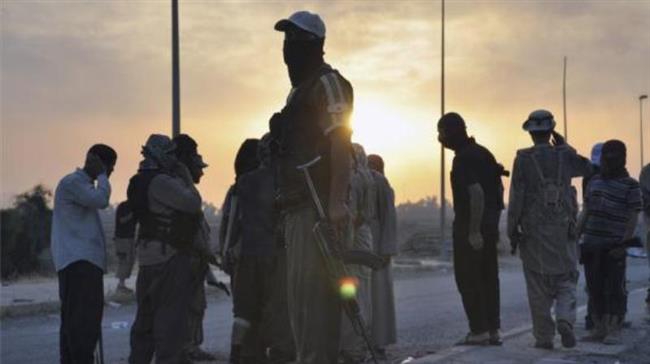Alwaght-At least three Sunni clerics have been killed and one injured in an area near Iraq’s southern city of Basra, a government spokesman said on Friday, an apparent sectarian attack that drew immediate calls for calm.
The Iraqi Interior Ministry said in a statement that attackers ambushed a vehicle carrying the four clerics late Thursday, in the district of Bab al-Zubeir.
The fourth cleric was seriously wounded.
No group or individual has claimed responsibility for the attack.
A statement from the office of Haidar al- Abadi, the Iraqi prime minister, said he ordered security commanders in Basra to "urgently work to reveal the circumstances of the attack" and arrest the perpetrators.
Raikan Mahdi, the head of the security committee for Al-Zubair district in Basra province said the attack took place as the clerics headed from provincial capital Basra to Al-Zubair on Thursday night, after attending a meeting on preparations to celebrate Prophet Mohammad’s (PBUH&HP) birthday.
Two police officers said they suspected the involvement of ISIS, which the Sunni clerics had urged local people to oppose.
"Initial investigation showed that one cleric's mobile was receiving death threat messages carrying the signature of ISIS. We are still working to reveal the murderers and bring them to justice," said a police colonel, speaking on the condition of anonymity.
An association of Sunni clerics also called for calmness in a statement issued Friday, arguing that the attack was carried out to ignite sectarian violence in Basra. Speaking later on state Iraqi television, the association's head, Khaled al-Mullah, said that ISIS and its supporters were the only beneficiaries of the attack.
This comes as Iraq has been witnessing violence since ISIS Takfiri militants entered the country from Syria and took control over large areas last June.
The militants have been carrying out horrific acts of violence, including public decapitations and crucifixions, against all Syrian and Iraqi communities such as Shiites, Sunnis, Kurds, Christians and Izadi Kurds.
Iraqi army soldiers, backed by volunteer forces, have been battling the Takfiri terrorists, making gains in different areas.
In recent weeks, the militants have executed many people including clerics, doctors, foreign aid workers, and journalists in the West East region.
The attack followed a visit to Basra this week by Shiite Prime Minister Haider al-Abadi and his tour of a Sunni area north of Baghdad on New Year's Eve. Al-Abadi on both visits spoke emphatically about the need for all of Iraq's religious and ethnic communities to close ranks in the face of the threat posed by ISIS.
Even though no claims have been announced, many clues and signs help in showing that ISIS and its Takfiri supporters are responsible for such attacks.
As a matter of fact, the Sunni clerics were planning to celebrate Prophet Mohammad’s (PBUH&HP) birthday, which is considered an infidel act according to ISIS.
According to Sunni Islamic narrations, the 12th of Rabi al-Awwal is recognized as the birth date of Prophet Muhammad (PBUH&HP).On the other hand, according to Islamic sources relied upon by Shiite Muslims the auspicious birthday of the Holy Prophet (PBUH&HP) was on 17th of Rabi-al-Awwal.
In order to bridge this difference and use it as an opportunity to unite all Muslims, the founder of the Islamic Revolution of Iran, Imam Khomeini designated the period of the Prophet’s birthday celebrations from 12th to the 17th of Rabi al-Awwal as the Islamic Unity Week. This dynamic concept aims to bring all Muslim schools of thought on the common platform of Islamic unity.
Even though some Muslim extremist from both Shiites and Sunnis opposed this approach of unity and called this week the week of rejection and repudiation (Baraa’a), most Muslims nowadays celebrate this week in the joy of the remembrance of Prophet Mohammad’s (PBUH&HP) birthday and in an approach to strengthen the common ties between Muslim sects.
The terrorist attack occurred near the upcoming of this great celebration as an attempt to increase sectarian tensions. Today, Iraq and the whole Muslim world are in most need for Islamic unity, which will strengthen their position in front of ISIS and other Takfiri terrorist groups.



























